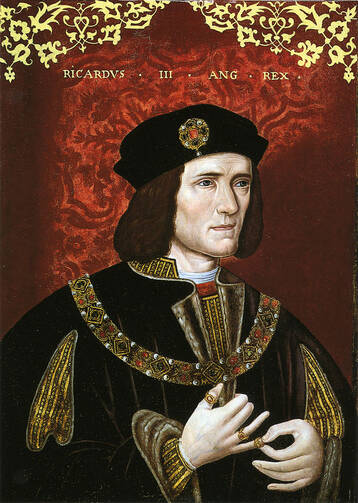Five hundred and thirty years ago, in a battle, a King of England fatally fell off his horse. His crown, so they say, not unexpectedly fell off his head and not inconveniently fell into the hands of his opponent Henry Tudor to whom it thus expediently fell to become the next King. The unfortunate and terminated King was Richard III of York, the last of the Plantagenet dynasty; the new King was Henry Tudor of the House of Lancaster, Henry VII; the battle was that of Bosworth Field and the conflict, which consumed England in the later 15th century and which this battle ended, is forever remembered as the Wars of the Roses. Richard’s remains were found recently and identified. This week has seen his elaborate reburial and solemn funeral in the East Midlands city of Leicester, near the site of the battle.
Henry Tudor’s PR men did a better job than Richard’s had done. Shakespeare, of course, made Richard widely known (with the help of Laurence Olivier) and, according to some, unjustly tarnished his reputation forever. He comes to us as a scheming and devious monarch, vilified for his alleged role in the imprisonment, disappearance and probable murder of his nephew, Edward V, and his younger brother Richard (of Shrewsbury) - the Princes in the Tower. Richard—the King, that is—had become the Lord Protector of the young uncrowned Edward, a minor, until claiming the English crown for himself in 1483. Shakespeare has him say, “Conscience is but a word cowards use” ("Richard III," 5.iii.109) This was the trouble with those Medieval and Middle Ages Monarchs, particularly absolute ones, and those who wanted to be—you never knew quite what they would get up to next. Henry, the last English king to win the crown in battle, engaged chroniclers to present his reign, and the launch of the Tudor dynasty, as the beginning of a new golden age (they had spin-doctors in those days too, although they had to manage without the internet). There are those who hold to this day that Shakespeare was unduly influenced by these publicists. Henry Tudor, of Welsh and English origin, would preside over the consolidation of English power as well as that of his own dynasty. It did these objectives no harm at all that he married into the House of York, uniting the warring factions of the Red and White Rose. The last Tudor monarch was Elizabeth I. The dynasty that Henry’s enthronement launched lasted all the way until the next dynasty came along—from the north it came too, that of the Stewarts, in 1603.
And so Richard, either a much-maligned, misunderstood monarch or a conniving, crafty conspirator concluded the previous dynasty, the Plantagenets, by falling, fatally wounded, off his horse and then, deceased, vanishing. That is, until his mortal remains were found in circumstances hardly fitting an Absolute Monarch; under the tarmac of a municipal car park being redeveloped in Leicester city centre. He had been hastily buried there by the Franciscans, in the long-demolished Greyfriars church. Earlier this week, after painstaking forensic research, those remains were brought from Leicester University, via Bosworth Field, to Leicester Cathedral. There actually is a Richard III Society, whose members are determined to rehabilitate him; they turned out in force. The cortege included two equestrian knights in full armour while many of the onlookers, determined to make a day of it, dressed themselves up in period costume as minstrels and jesters and, according to one report, as giant turnips. The essential and gloriously English eccentricity of the whole episode was thus summed up.
Cardinal Vincent Nichols, the Archbishop of Westminster and leading English prelate, invited to preach at the arrival of the coffin at the Anglican Leicester Cathedral, wisely said next to none of this. His Eminence opted for a different angle. Sprinkling holy water on the coffin, the Cardinal spoke of Richard’s baptism (as a Catholic – the Reformation was down to Richard’s descendant, Henry VIII, although Nichols prudently didn’t say that either) and of how his life was shaped by violence and an “anxious devotion.” He noted that political power-struggles were always settled, usually brutally, in those days on the battlefield. In a remark that might astonish politicos engaged in a Shakespearian struggle in our current UK general election, Nichols suggested that we “may thank God that here political power struggles are now settled in a different manner.”
Almost every detail of the whole story, since the discovery of these remains in 2012, has been bitterly contested. There had previously been a campaign from people in York to have “this son of York” properly interred in, well, York. Over 15,000 people signed an online petition to this effect. Others complained that the whole episode had got out of proportion; some complained about the total cost, estimated at over £2.5m, held to be scandalous in a time of austerity. Others are queuing—another English eccentricity—for up to four hours to stare and point at the coffin before the final burial on Thursday, Mar. 26. Born into conflict and killed in conflict, and despite the strangely enduring addiction to reverential forelock-tugging to royalty of at least some of this country’s subjects, Richard has not stopped causing trouble. Perhaps Shakespeare was right after all. Perhaps Richard is, indeed, one who to this day does “[…] seem a saint, when I most play the devil.”








